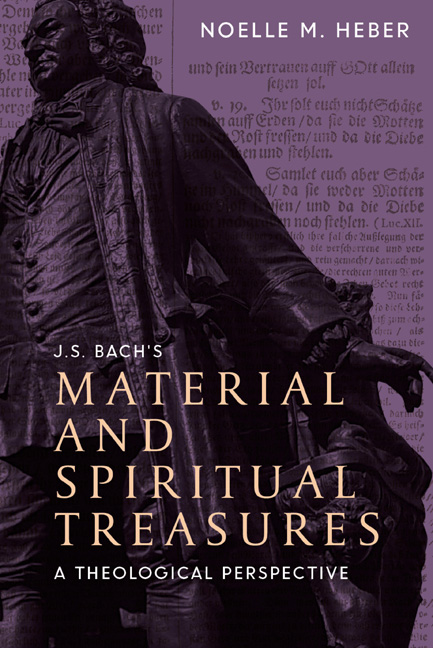Book contents
- Frontmatter
- Dedication
- Contents
- List of Illustrations
- List of Music Examples
- Foreword
- Preface
- List of Abbreviations
- Introduction
- 1 Bach’s Material Treasures: Career, Salary, and Freelancing
- 2 The Servant Prince: Poverty of Christ: Three Days of Christmas (BWV 91, 197a, 248/I, 121, 151)
- 3 Mammon’s Chain: The Destructive and Redemptive Potentials of Material Wealth: Ninth Sunday after Trinity (BWV 105, 94, 168)
- 4 The Afflicted Shall Eat: Tables Are Turned in Eternity: First Sunday after Trinity (BWV 75, 20, 39)
- 5 Spiritual Manna: The Lord Embraces the Poor: Seventh Sunday after Trinity (BWV 186, 187)
- 6 ‘Blood Money’: The Coins that Bought Jesus’ Death: Good Friday (St Matthew Passion)
- 7 Bach’s Spiritual Treasures: Values and Priorities
- Bibliography
- Index of Biblical References
- General Index
3 - Mammon’s Chain: The Destructive and Redemptive Potentials of Material Wealth: Ninth Sunday after Trinity (BWV 105, 94, 168)
Published online by Cambridge University Press: 27 March 2021
- Frontmatter
- Dedication
- Contents
- List of Illustrations
- List of Music Examples
- Foreword
- Preface
- List of Abbreviations
- Introduction
- 1 Bach’s Material Treasures: Career, Salary, and Freelancing
- 2 The Servant Prince: Poverty of Christ: Three Days of Christmas (BWV 91, 197a, 248/I, 121, 151)
- 3 Mammon’s Chain: The Destructive and Redemptive Potentials of Material Wealth: Ninth Sunday after Trinity (BWV 105, 94, 168)
- 4 The Afflicted Shall Eat: Tables Are Turned in Eternity: First Sunday after Trinity (BWV 75, 20, 39)
- 5 Spiritual Manna: The Lord Embraces the Poor: Seventh Sunday after Trinity (BWV 186, 187)
- 6 ‘Blood Money’: The Coins that Bought Jesus’ Death: Good Friday (St Matthew Passion)
- 7 Bach’s Spiritual Treasures: Values and Priorities
- Bibliography
- Index of Biblical References
- General Index
Summary
Niemand kan zweyen Herren dienen: entweder er wird einen hassen und den andern lieben, oder wird einem anhangen und den andern verachten. Ihr könnt nicht GOtt dienen und dem Mammon.
Matthäus 6.24THE Bible warns that material wealth, when given too much impor- tance, can become an obstacle to eternal life. The power of money is expressed through strong images in Scripture, such as ‘It is easier for a camel to go through the eye of a needle than for a rich man to enter into the kingdom of God’ (Mark 10.25) and ‘For the love of money is a root of all evil: which some coveted after, and [that is why] they have erred from the faith, and caused themselves much pain’ (I Timothy 6.10). The Greek word here translated as ‘love of money’ is ϕιƛαργυρία/philargyria. Martin Luther chose the word ‘Geiz’ (stinginess/greed) for his translation while it was changed to ‘Geldgier’ (greed for money) in later versions of the German Bible.
The Reformation was ignited when Luther condemned the Catholic Church for its teachings and practices related to misuses of money in his Ninety-Five Theses. These included the monastic vow of poverty, the sell- ing and buying of indulgences, and usury. Furthermore, while the Catholic Church had equated piety with a lack of possessions – either due to one's economic situation or by renouncing them – Luther taught that money is not evil in and of itself and that it is possible to obtain earthly wealth and still worship and honour God. It is the spiritual state of the possessor of wealth and not the wealth itself that makes it helpful or hurtful. According to Luther, wealth is a source of great temptation since it could draw one's heart away from God and become an idol. He admonishes believers, ‘Even if you should become rich justly and with God's help, do not depend on this either, and do not make mammon your god.’
Heinrich Muller expresses a similar perspective on Mark 10.25 (see verse quoted above) about how unlikely it is for a rich person to be saved:
Wealth does not condemn anyone, but rather placing the trust in wealth. For if I give my heart to riches, then wealth is my god. If it is my god, then I serve it. If I serve it, it rewards me. With what? With hell.
- Type
- Chapter
- Information
- J. S. Bach's Material and Spiritual TreasuresA Theological Perspective, pp. 91 - 114Publisher: Boydell & BrewerPrint publication year: 2021



